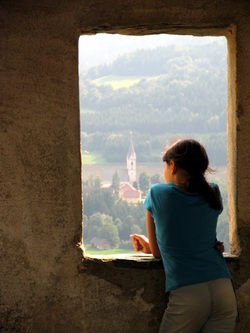|
The Barnies Beatles lead with a 3 week schedule  Beginning this Sunday the 29th April with a 3 week series, the organically growing church musical groups being cultivated from the St Barnabas Creative Worship Workshop will lead worship at the 10am Family service. Promising voice, rhythm and a tune (mostly) for the whole family to tap their feet too, feeling the beat and comfortably enjoying the Holy Spirit in the true St Barnie's Way. Come on Sunday and witness the creative side of worship and how it’s growing within the congregation right here at St Barnabas and what’s more it’s guaranteed to be a lot of fun. See you there.
2 Comments
In the message yesterday we read in 1 John about the aged John’s desire for a fellowship to be the inclusive close group of all having a common faith and experience of Jesus -- the bond that holds them together
I did not mention that perhaps the background to this was a group who had broken fellowship and withdrawn from close knit fellowship of the believers in that place – the aim of all our churches and certainly an aim of St Barnabas There are people who today find the church unhelpful, and without giving up their faith, withdraw from Sunday worship and other Christian activities of their local church. I think John would want to resist that tendency and encourage people to attend and participate for their own good and for the benefit of those who have been deprived of their input. What do you think? Brian (and more on what is church)  Stephen posed the question "What is church", a question that has been sitting on my mind, and I formulated some responses in my mind (one is posted at this link here). Then Easter rolled around, and events happened, and I heard things, and a new perspective emerged for me on the meaning of the resurrection, and implicitly on the meaning of church. Easter is over and, if you're like me, you've had a string of sermons and other events around the death and resurrection of Jesus. Even so, our rituals and celebrations clearly have not done justice to this pivotal event of all time ... in fact I'm willing to bet each of us probably even had a moment of boredom somewhere along the way. Go on, admit it. At some stage in the familiarity of proceedings I'm sure most of us had a yawn moment, a glance at the watch and "when will this service be over" moment. It's not any fault of the church, or the leaders -- the root is in us, and I think perhaps part of it is because we don't always tell the whole story of the resurrection. Unfinished business is the problem. Ok, so Jesus came, taught, loved, served, laughed, cried, died, and rose again. Big deal? Yes! Amazing? Absolutely! Incredible, indescribable, beyond comprehension, a mystery, all yes, yes, yes. All reason enough for the most awesome duality of grief and celebration, for a time of joyful seriousness and serious joyfulness. Yet we fluff it, big time, condensing something so full of meaning into words of familiarity. Unless you and I are living the moment-by-moment vibrancy of son-full relationship, we end up mostly as intellectually assenting observers. So if I'm arguing that this is partly because we don't tell the whole story, just what is it that I'm getting at? First, the story doesn't end on Easter Sunday morning. The resurrection is rather like the label on a box that contains an indescribably wonderful present. Its the title to a story that stretches into the past and the future, and for each of us is still developing to our own really critical climax! Lets take a moment and see how Jesus tells it. One big clue comes in Luke's recounting of a post-resurrection event. Its over, Jesus is in his risen glorified body. The battle is forever won. And then somewhere out in the countryside Jesus joins up with the two guys who are walking from Emmaus -- these two are simply trudging along in sandals on a dusty track when Jesus appears (nowdays you or I would probably be enclosed in our car breaking the speed limit as we rush from nowhere to nothing – I wonder if we'd even stop for a hitchhiking Jesus). They don't recognize him, but they let him join their conversation -- I wonder who they thought he was? Anyway, imagine you're one of these two guys … you're having a really serious conversation, you're deeply upset about events, and this “stranger" starts to ask you what you're talking about. The reaction from these two was at first one of incredulity, I wonder if they thought Jesus was trying to be clever or just stupid? Yet once they explain it, just about the first contribution from Jesus is “you thick headed dolts, don't you see!” Now if it was me I'd probably have snapped right back at him, stopped the car, and asked him to get out – in this day and age none of us take kindly to being told we're foolish (maybe because so often its true?). But whatever their inner reaction was, they listen with growing astonishment as Jesus lays out the big picture of revelation history right up to and past the crucifixion. Later on we're told how when these two guys know it's Jesus, they say how their hearts were burning at what he had to say, so he must have got over any initial social awkwardness very quickly. But just what was Jesus doing? He's unwrapping the present for them, he's explaining the gift that they've received. Like a child given a present that's more age appropriate to someone older, the parent first has to explain what it is before the child can appreciate it. Ok, so we've got this present, this big picture of something that goes back as far as can be remembered, so what? Well, to consider this further we need to go to something else Jesus once said. It was a time when he was in his story mode, and was telling about this boss who had three employees. The boss tells his guys that he's going on a trip, but he's going to leave his wealth in their hands to be looked after. So he divides the responsibility between them. He doesn't divide equally, but gives responsibility according to his recognition of what they would be able to handle. Then he's off on his trip and these three guys are left with the task of trying to do something with all the money. Well, inevitably the boss comes back and asks them for an account. You know the story, two of guys have invested and made more money from the initial capital; they took some risks, they made the money work because they knew what they had was valuable and could be used to grow more value. But the third guy did the proverbial equivalent of hiding it in his sock, and the boss was really, really fed up with him! This last guy hadn't done anything wrong, hadn't lost anything, its simply that he was entrusted with something and did nothing with it. He was apathetic, protecting rather than using, and even scared -- he feared personal consequence more than serving his boss' interests and doing what was right. He simply played it safe, or so he thought. (I wonder sometimes if, in Jesus' story, one of the other guys had made a loss instead of a profit -- what would Jesus have said?) So lets put together these two accounts of Jesus' nature and see what we find. Jesus has given you and I the responsibility of an incredible treasure ... he's explained it, unpacked it, taken time with us to talk it through and help us understand ... this recount of the investment that God has made in the world, this incredible story of risk and success, the astounding outcome that death is beaten, and that relationship can be restored. He's given us the financial advisor's equivalent of "this is my inside knowledge of how you too can benefit". And what do we (so often) do? We hide it in our sock. And what do you think Jesus feels about that? So what then is this meaning of the resurrection, what is the fuller story? Yes, Jesus came to live, die and rise again in order to save us ... that's the fundamental story line. But the next chapter is that he's entrusted this treasure to us, this knowledge of an amazing gift, and he wants us to DO something with it. That's the additional meaning of the resurrection, that what the implication is once you get past Easter services. The boss has given some of his treasure to you and wants you to use it, to takes some risks and make a return on the investment ... for the boss' sake, and you'll share in the returns. Where does he want us to do this something? Out there, and in here! Most importantly out there in the world that doesn't know him, and in here in StB so we can support each other and build the foundation needed to work for the boss out there. We do something with this treasure in StB where its a safe place, where the boss can guide and instruct us, where we can lean on each others strengths, in order that we can represent our boss in the world. But what are we to do, what is this "something"? For you personally, I don't know. Almost certainly its something you are able to do whether you think so or not. I wouldn't worry about what it is you do. Just do it. Remember the story, where the boss gave his money according to his workers ability? He knew what his workers were capable of, and did not ask of them any more than he knew they could do. His intentions are not measured by how big the return on the investment is, but simply by whether we do anything with it at all. So, which of those three employees am I, which are you? Jesus says "just do it". Inside StB you can serve coffee, welcome people, help run events, teach Sunday school, join the worship group, pray, read, bless, sing loudly in the services, bring a friend, befriend a stranger ... the list of possibilities is endless. There's no shortage of opportunities and no shortage of abilities. Then, as we do it in StB, so we take that strength and do it outside where its so desperately needed. That is one of my answers to Stephen's question "What is church". Church is those people who "do it". And that is the meaning of the resurrection beyond our own personal salvation. The resurrection is a great big flashing neon sign that towers over all and labels the present we've been entrusted with by our boss. And he's wanting to see us do something with it. Not the institution. You. Me. Stephen writes here on what church is about ... a really great question that we probably all ask ourselves from time to time. We encourage you to add your thoughts either in your discussions, or right here by adding a comment below.  I guess it is to be expected that I should start thinking about this after moving to St Barnabas. There is much that is different from the previous parishes I have worked in (not better or worse – just different) and some things that are very familiar. But it led me to muse on what it is that makes a church. Firstly there is the building – yes, the church is the building. Not only the building but you can’t deny that the building is part of who we are. St Barnabas is a space with potential – the church is big enough to accommodate a large group; it has spaces for music groups, for flower/art/photographic displays; and the acoustics to host choirs or plays. Barnies [the hall] too is full of potential for Alpha and other Bible study/fellowship activities. Penny’s first thought was TV and rugby – I guess that will come. And then there is the kitchen and children’s room and possibly at some future date the school next door. We also have the potential for a garden – or a labyrinth or quiet space. Our church building is part of who we are as Church. Then there is the Liturgy. We don’t seem to use a lot at the moment and it certainly doesn’t define us but we are an Anglican Church and so we have a very rich heritage of liturgical practices we can call on. Not only from South Africa but from around the world – Celtic Spirituality, Taize are two options out of many. We can certainly make use of people’s talents here – Good Friday saw a three-voice reading – not too far from adding drama or dance or a delicate AV presentation. How many ways can we express our worship and joy that speaks of who we are and who God is? Our use of liturgy (whether formal or spontaneous) adds tremendously to who we are as church. Of course the people make up the church – and what people! People full of passion and commitment; full of warmth and welcome. Leaders in the front may be the very visible face but the people in the pews are the ones who can reach out to newcomers looking for books or regulars looking downhearted. We are all Christ’s hands and feet and voice to the world. I look forward to sharing and growing together as we investigate prayer and theology; worship and community service; reaching out and reaching in. We are a church of potential – and a people of depth. How exciting that God has entrusted us with so much to share. We are His Church.  Easter is a time when platitudes are aplenty. Church bulletin boards, banners on walls, hymns so well worn that we don't even notice they're part of our clothing. Yes, it is an important time, a central event to remember. But what do you remember? I was reading an interview with Michael J Fox ... you remember him? He's famous for playing Alex Keaton in the sitcom "Family Ties", and of course in the movie trilogy "Back to the Future" (which, by the way, is a wonderful Christian concept). What's probably forgotten by many is that Michael Fox was diagnosed with Parkinson's disease at the age of 30. The interview is a good read ... you can get it here. Near the end of the interview he remembers when he was first diagnosed, and recounts how he was talking with his wife Tracy: When I first heard about my diagnosis, I was so angry. And Tracy just looked at me, and said simply, "In sickness and in health." Isn't that Easter in a nutshell (eggshell)? We are diseased, we go through life angry at our misfortune, we rant and rave against the inequities, and we fume at our inadequacies. Jesus simply says to us "In sickness and in health". He has made a vow, and He keeps his promises, He will do whatever is needed in our sickness and health. And so He goes to the cross while we sleepwalk our way through a world of sickness. And then He rises again to take our maladies away. .... In another interview Michael Fox says "When we married, we married--and that was it. We were in love then, as we are now, and we planned to stay married." So may we also say this Easter weekend.  Contributor: Brian I read on a blog a few months ago someone asking why Christians had not written a book giving the evidence for the Resurrection of Christ on the third day. I did not write to the blog but this person must not have looked very hard as there are lots of books which have looked in to those events which we are going to celebrate this weekend – the death of Jesus on the cross and then the incredible first Easterday when the tomb was empty and Jesus was seen alive again. One of the older books on the resurrection is titled “Who moved the stone” ( by Frank Morison). It is one of many well-argued books on this remarkable event What I find fascinating is the first chapter entitled “the book that refused to be written” in which the author tells us how he set out to write a book disproving the resurrection but as he looked in to the evidence he came to the conclusion that the only reasonable explanation was that Jesus did rise from the grave A more modern book on the subject “The reason for God” by Timothy Keller has a chapter “the reality of the resurrection” where he also goes over the compelling evidence for the resurrection of Jesus The modernist wants to test these facts while I suspect there are many in the post-modern world who are not so much concerned about the historical evidence but about how the resurrection makes them feel and what difference it makes to their lives – is it relevant in the 21st Century? I plan to touch on some of these issues on Easter Sunday at 9am. Your comments before or after are most welcome |
Important: The views expressed on this blog do not necessarily reflect the official position of our church
Like to Write? Archives
June 2015
|

 RSS Feed
RSS Feed

